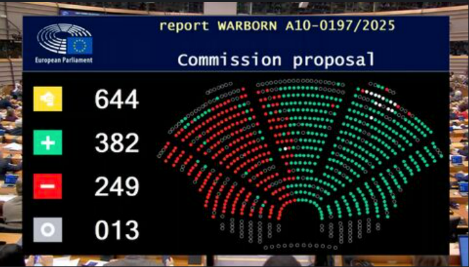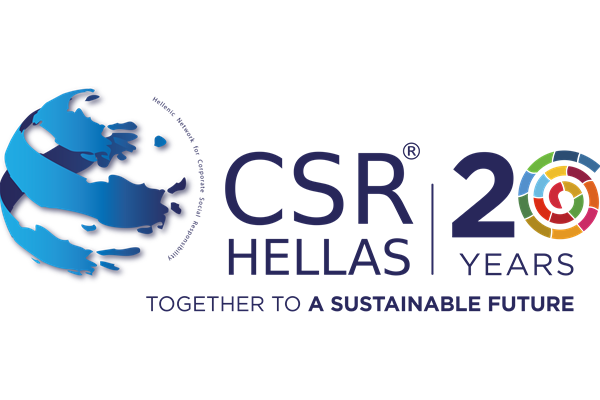EU Policy Updates November
Read below the latest updates in EU regulations. For more information about how these regulations might apply to your company, email Morris Massarutto, Senior Project Manager at mm@csreurope.org
CSR Europe selected as Partner of the European Parliament Intergroup on “Attracting Investment to Ensure a Competitive and Sustainable EU”
We are pleased to announce that CSR Europe and the European CSO Network have been selected as partners of the European Parliament Intergroup on “Attracting Investment to Ensure a Competitive and Sustainable EU” for the 2024–2029 legislative period.
To maintain global leadership and strengthen its growth potential, the EU must reinforce investments in innovation, infrastructure, and the transition towards a sustainable economy and industry. The Intergroup will play a crucial role in shaping forward-looking policies that address current geopolitical and economic realities, bridging the gap between public and private investment.
CSR Europe’s mission closely aligns with the Intergroup’s objectives of enhancing European competitiveness, advancing the transition to a sustainable economy, and strengthening strategic resilience through targeted investments. Through a network of over 10,000 companies and 30+ national partner organizations, CSR Europe provides a platform for multi-stakeholder collaboration and acts as a catalyst for innovation, fostering a sustainable and inclusive society across Europe and beyond.
Together with the European CSO Network, CSR Europe will contribute to the Intergroup’s work through events and stakeholder engagement, focusing on critical investment priorities such as the innovation-led transformation of European industry, sustainable economic and social infrastructures, unlocking the full potential of the Single Market, and funding for SMEs and mid-caps.
Our shared goal is to ensure that Europe’s investment agenda not only drives competitiveness but also delivers positive social and environmental impact.
If you are interested in joining forces to shape the future of a sustainable European industry, please reach out to us at mm1@csreurope.org and mm@csreurope.org to learn how you can contribute.
2. Omnibus trilogue set to begin after European Parliament vote on 13/11
Trilogue negotiations on the Omnibus Directive are about to start, with a tentative goal of reaching a political agreement by 8 December. Following the European Parliament’s vote on 13 November, the negotiating landscape has shifted, leaving several areas where the positions of Parliament and Council remain misaligned.
Vote from the European Parliament on 13/11
CSRD (Corporate Sustainability Reporting Directive)
• Reduced scope: ≥1,750 employees and ≥€450M turnover + full exemptions for listed subsidiaries and financial holdings (COUNCIL: ≥1,000 employees and ≥€450M turnover + full exemptions for listed subsidiaries)
• Limits on information requests: Cap of information requests limited to VSME (=COUNCIL) but higher scope + specification if any request beyond and right to decline if out of scope
• Introduction of sector-specific guidelines, instead of standards meaning that sector-specific reporting will now become voluntary
CSDDD (Corporate Sustainability Due Diligence Directive)
• Reduced scope: Companies with ≥5,000 employees and ≥€1.5 billion turnover (=COUNCIL)
• Risk-based approach across their operations, subsidiaries and partners on identification of Impacts and restriction on information requests. Priority on highest risk business partners and areas based on existing data
• Civil Liability: Removal of EU-wide liability regime (=COUNCIL) BUT WITHOUT review clause
• Climate Transition Plan (CTP): Climate Transition Plans and guidance deleted (COUNCIL: Obligation to adopt a plan + implementing actions deleted + alignment with Paris Agreement required)
EU Taxonomy
• Aligned with the new CSRD thresholds, applying only to large businesses
Trilogue negotiations begin 18 November, with institutions aiming to finalise the package by end-2025. The Commission will play its usual role as facilitator, supporting the Parliament and Council in reconciling positions during this decisive phase.
As the process unfolds, the Omnibus package is taking shape with lighter reporting requirements, narrower due diligence obligations, and reduced climate-related requirement for EU companies.
Should you be interested in learning more about the Omnibus Simplification Package through CSR Europe’s EU Trainings, please feel free to reach out to Marta Mucci (mm1@csreurope.org).
3. EUDR: Parliament activates Urgent Procedure to speed up a deal
The European Parliament has voted to use the urgent procedure for the EUDR amendments. This opens the door to immediate trilogue negotiations among Parliament (ENVI), the Council (Coreper), and the Commission. A provisional agreement will then require approval from both co-legislators.
While maintaining the December 2025 start date, the European Commission has proposed targeted simplifications aimed at reducing administrative burden. These include:
Streamlined reporting obligations for micro and small operators in low-risk countries;
Removal of duplicate due-diligence statements for downstream companies, with only one submission required at market entry;
A more efficient, fully integrated IT system to support compliance across the supply chain.
At the same time during last week’s Coreper I meeting, the Council supported a full 12-month extension for all operators and traders, going significantly further than the Commission’s earlier, limited proposal. Under the Council’s emerging position:
Large firms would have until end-2026,
SMEs would have until June 2027.
However, Member States remain divided on how far simplifications should go. As a result, no formal negotiation mandate was agreed, and the Danish Presidency now faces the task of finding a compromise.
Despite political uncertainty, companies placing EUDR-covered products on the EU market should continue preparing for the current deadline of 30 December 2025:
If the delay is ultimately adopted, businesses will benefit from additional time to adapt and strengthen due-diligence systems.
If not, being fully prepared by the original date will ensure continued market access.
The coming weeks will be decisive in determining whether the EU can balance administrative simplification with maintaining the environmental credibility of a flagship regulation.
4. EU - DRC partnership strengthened through Global Gateway
The 2025 Global Gateway Forum served as key platform to reaffirm the European Union’s strategic partnership with the Democratic Republic of Congo (DRC), a key ally for Central Africa’s sustainable development and for advancing the continent green and digital transitions.
Through the Global Gateway initiative, the EU and DRC are deepening cooperation across infrastructure, energy, biodiversity, and critical raw materials. The European Commission and Team Europe announced over €180 million in new investments to support flagship projects, including:
The Kivu–Kinshasa Green Corridor (€60.5 million), combining nature conservation, sustainable infrastructure, and green economic development.
The Lobito Corridor (€16 million) to strengthen agricultural value chains and regional trade.
Electrification of Kisangani, with €20 million in EU grants unlocking €70 million in AFD loans.
Critical Raw Materials cooperation, with €13.8 million to promote responsible cobalt extraction and strengthen the Ministry of Mines.
These initiatives aim to drive sustainable growth, promote responsible resource management, and enhance regional integration.
5. Sustainable Finance Disclosure Regulation Revision expected to be postponed to early 2026
The European Commission continues its review of the Sustainable Finance Disclosure Regulation (SFDR), in force since 2021, which requires financial market participants and advisers to disclose sustainability information at both entity and product levels. The review aims to improve legal clarity, usability, and effectiveness against greenwashing, while reflecting feedback gathered during two public consultations in 2023 and additional stakeholder input.
Although the Commission’s work programme schedules a revised proposal for Q4 2025, EU observers now expect a potential delay to early 2026. The revision could include clearer fund classifications, more proportionate disclosure requirements, and stronger alignment with other sustainable finance legislation. The update will be key to restoring investor confidence and ensuring that the SFDR supports the EU’s broader green finance framework.
6. EIB launches second phase of Climate Bank Roadmap
The European Investment Bank (EIB) Group has launched the second phase of its Climate Bank Roadmap and Energy Sector Orientation, endorsed unanimously by its Board on 30 September 2025. The move reaffirms the EIB’s role as the EU’s main financier of the green transition.
At the High-Level Dialogue “Making the Green Transition a European Success”, EIB President Nadia Calviño, Commission Executive Vice-President Teresa Ribera, and EIB Vice-President Ambroise Fayolle highlighted the need for coordinated EU action to turn Europe’s climate ambitions into tangible results.
The new roadmap focuses on three priorities:
Boosting competitiveness and energy security by investing in affordable, locally produced clean energy and innovative cleantech.
Doubling climate adaptation finance to €30 billion (2026–2030), addressing mounting climate-related losses in Europe.
Simplifying access to green finance, especially for SMEs, through streamlined procedures and reduced administrative burdens.
The EIB will also reinforce its support for the Clean Industrial Deal and Affordable Energy Action Plan, strengthening wind energy, grid resilience, and industrial decarbonisation efforts.
LATEST NEWS









